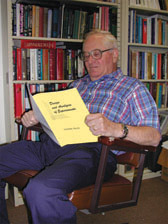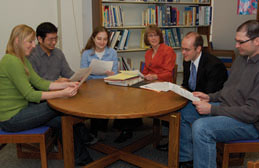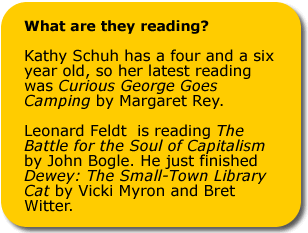|  Psychological Psychological
and Quantitative Foundations 
Feldt's Book Respected Around the World
 Feldt continues to revise his popular experiment design book. Feldt continues to revise his popular experiment design book.
|
When Professor Emeritus Leonard Feldt (PhD ’54) began teaching Design of Experiments in the mid 1970s, he taught using E. F. Lindquist’s text. The book was thin and light on explanation—Lindquist believed that students would learn best by doing exercises.
Feldt supplemented the text with hundreds of handouts until it went out of print in the late 1970s. Rather than discard his handouts because they wouldn’t work with a new text, Feldt revised Lindquist’s book chapter by chapter.
In 1983, he began putting the chapters together in textbook form and having it printed informally at the University. That way, his book was inexpensive for students and he didn’t have to adapt it to fit publishers’ requirements.
When Feldt retired in 1994, Associate Professor Timothy Ansley (PhD ’84) took over the Design of Experiments course and continued to use Feldt’s book. Fifteen years later, Ansley is still using the text and Feldt is still revising it for him as needed. Ansley said it’s an honor to use his mentor’s book. And his students like it too. “He has a marvelous way of expressing thoughts,” Ansley said. “His book reflects the way he taught. Folks from all over campus take this course, in no small part because of this book.”
Ansley said many alumni contact the College and ask if they can use Feldt’s book in their own teaching. Seonghoon Kim (PhD ‘04), an assistant professor at Keimyung University, is even working on translating the book into Korean and hopes to get it published there one day soon.

Dynamic Website Helps Educators Explore Teaching Strategies
Educational Psychology Associate Professor Kathy Schuh has created a think tank of College of Education students. The group collaborates on her DEPTH project, a website designed to help educators discover and consider the relationships between strategies they use in the classroom, learning theories behind those strategies, and the world views underlying those theories.
The project, an acronym for Decisions in Education through Perspective and Theory, has been active since 2006. More than two dozen graduate students have been involved in writing for the site. The site is explorative. For example, if an educator using the site wanted to learn more about lecture, he or she could read about conditions under which one might choose to lecture, how learners might respond, what materials might be used, and what methods to employ in a lecture.
 Schuh (third from R), and her team of graduate students collaborate on the DEPTH website. Schuh (third from R), and her team of graduate students collaborate on the DEPTH website.
|
“So, if you value efficiency in delivery of information, lecture is a likely strategy for you,” Schuh said. “If you value things like individual exploration of topics, lecture wouldn’t be a great choice.” Schuh said she hopes her site will be a practical tool for anyone and encourage teachers to be conscious of their choices in the classroom.
“My goal would be that people would take away a newfound understanding that there’s more to doing a lecture than just standing up and lecturing,” she said. “We’re making people aware of the theories on which they’re basing their instruction,” said Joni Lakin, a doctoral candidate in Educational Psychology and a member of the DEPTH team.
Through developing the site with her team of graduate students, Schuh has noticed another positive outcome of the project: it provides a great opportunity for graduate students from different programs to spend time together and expand their knowledge of educational theory and psychology.
 Sam Van Horne, a doctoral candidate in Language, Literacy, and Culture, said that’s why he joined the DEPTH team. “When you’re forced to write about a theory, you really have to know what you’re talking about and learn the theory much better so that you can explain it to someone else,” he said. Sam Van Horne, a doctoral candidate in Language, Literacy, and Culture, said that’s why he joined the DEPTH team. “When you’re forced to write about a theory, you really have to know what you’re talking about and learn the theory much better so that you can explain it to someone else,” he said.
Schuh said the ongoing project is a work in progress and will continue as long as there are students interested in being on her team.
Visit DEPTH online at http://depth.education.uiowa.edu/

|
